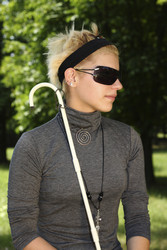3D assistance for the visually impaired
The EU-backed project DIGIGLASSES (Development of 3D digital glasses for enhancing mobility of visually impaired people to open strategic product lines for participant SMEs) developed 3D glasses that give users stereoscopic vision, allowing them to judge distances in their environment. Consortium partners outlined the functional system specifications for the digiglasses. They then developed the hardware and software necessary for creating the desired functions, while allowing for optimisation and fine-tuning where needed. Researchers then designed the optical part of the system, which lets the user see the image in front of them at the proper distance. Consortium members prepared the manufacturing processes and contacted manufacturers before creating the prototypes. The 3D glasses produced are affordable, stylish and functional. A video animation showing the concept of the project was disseminated through YouTube and Facebook, and is also available on the project website. DIGIGLASSES successfully completed its tasks and demonstrated the complete DIGIGLASSES system: hardware and software containing the head-mounted display (HMD) system, HMD camera, optics system, image processing DSP (hardware and embedded software), and PC-based configuration software. The second and third main results of the project are also marketable innovations on their own. For example, the HMD system and the configuration software that contain the knowledge of the applicable image modification processes can be sold as separate technology. DIGIGLASSES will help people with poor vision get jobs more easily and work in a wide range of environments. This invention is highly suited to the global demographic trend. As a newly developed high-tech product, it can serve the visually impaired worldwide on an everyday basis and improve overall quality of life.
Keywords
Visually impaired, eye disease, digital glasses, stereoscopic vision, head-mounted display







